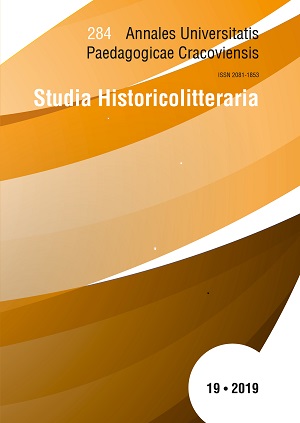Jedna, żadna i sto tysięcy. Włoszka jako medium
Main Article Content
Аннотация
The stake in a heated discussion on reviving tarantism in the Salentian culture by initiators and partcicipants of the project ‘The spider of a dancing god’ was the reinterpretation of the phenomenon itself: tarantism, which was perceived as a thing of the past and an embarrassing social problem, was to become artistically modified, namely isolated from life and displayed on stage. Rejecting tarantism as a folk practice and an attempt at representing it could also be interpreted as turning a blind eye to the problem of a woman’s position in society, without proposing anything in turn. Technological and social progress did not go hand in hand with the emancipation of an Italian woman. Luigi Piradnello in his drama, and Franka Rame in her monodrama captured this phenomenon brilliantly.
Скачивания
Article Details

Это произведение доступно по лицензии Creative Commons «Attribution-NonCommercial-NoDerivatives» («Атрибуция — Некоммерческое использование — Без производных произведений») 4.0 Всемирная.
ПОЛИТИКА АВТОРСКИХ ПРАВ
Издатель «Annales Universitatis Paedagogicae Cracoviensis. Studia Historicolitteraria» имеет право использования и распространения всех опубликованных в издании материалов на основании договора неограниченной во времени неисключительной лицензии - предварительно заключенного на неоговоренное время с каждым автором конкретного произведения на оговоренных в том договоре условиях использования.
ПОЛИТИКА ОТКРЫТОГО ДОСТУПА
«Annales Universitatis Paedagogicae Cracoviensis. Studia Historicolitteraria» это издание с открытым доступом, а все его содержание доступно бесплатно для пользователей и организаций на основаниях неисключительной лицензии CreativeCommons (CC BY-NC-ND 4.0). Пользователи могут читать, скачивать, копировать, распространять, производить поиск или переходить по ссылкам к полным текстам статей в этом издании без предварительного согласия издателя либо автора при условии указания источника доступа и авторства данной публикации. Это согласуется с определением открытого доступа BOAI (http://www.soros.org/openaccess).
Библиографические ссылки
A.O., Tak jest, jak się państwu zdaje, „Radio i Telewizja”, 9.07.1967, nr 28, http://encyklopediateatru.pl/artykuly/172465/tak-jest-jak-sie-panstwu-zdaje (dostęp 8.05.2017).
B.B., Tak jest, jak się państwu zdaje, „Radio i Telewizja”, 25.06.1967, nr 26, http://encyklopediateatru.pl/artykuly/172487/tak-jest-jak-sie-panstwu-zdaje (dostęp 8.05.2017).
Brahmer M., Spotkanie po 25 latach, [w:] Listy Teatru Polskiego. Sezon 1961–1962, nr 51, s. 16–19, http://www.eteatr.pl/pl/programy/2013_11/52024/tak_jest_jak_sie_ panstwu_zdaje_teatr_polski_warszawa_1961.pdf (dostęp: 8.05.2017).
De Martino E., Ziemia zgryzoty, przeł. W. Marucha, Warszawa 1971.
Heistein J., Wstęp, [do:] L. Pirandello, Wybór dramatów, oprac. J. Heistein, przeł. Z. Jachimecka, L. Chrzanowski i J. Jędrzejewicz, Wrocław 1978, s. III–LXXVI.
Lapassade G., Essai sur la trance, Paris 1976.
Łubieniewska E., Telewizyjne gry Pirandellem, „Annales Universitatis Paedagogicae Cracoviensis. Studia Historicolitteraria XVII” 2017, s. 135–149.
Krakowska J., PRL. Przedstawienia, Warszawa 2016.
Nocera M., Ukąszeni. Rozmowy z tarantystami, przeł. A. Koman i K. Woźniak, „Performer” 2017, nr 14, http://www.grotowski.net/performer/performer-14/psychodeliczny- -pajak-lapassade (dostęp: 23.09.2019).
Passerini L., Ambiwalencja wizerunku kobiety w kulturze masowej, [w:] Antropologia ciała, oprac. A. Chałupnik, J. Jaworska, J. Kowalska-Leder, I. Kurz i M. Szpakowska, red. M. Szpakowska, Warszawa 2008, s. 103–127.
Pirandello L., Wybór dramatów, oprac. J. Heistein, przeł. Z. Jachimecka, L. Chrzanowski i J. Jędrzejewicz, Wrocław 1978.
Pizza G., Il tarantismo oggi. Antropologia, politica, cultura, Roma 2015. Przedruk fragmentów w przekładzie na język polski: G. Pizza, Psychodeliczny pająk Lapassade’a, przeł. A. Koman i K. Woźniak, „Performer” 2017, nr 14, http://www.grotowski.net/ performer/performer-14/psychodeliczny-pajak-lapassade (dostęp: 23.09.2019).
Podgórzec Z., Przewrotna prawda Pirandella, „Ekran”, 16.07.1967, nr 29, http://encyklopediateatru.pl/artykuly/172473/przewrotna-prawda-pirandella (dostęp 8.05.2017).
Puzyna K., Pestka, [w:] tegoż, Burzliwa pogoda. Felietony teatralne, Warszawa 1971, s. 41.
Rame F., Fo D., Tutta casa, letto, chiesa. Sei monologhi, Mediolan 2006.
SEG., W plenerze (fragm.), „Głos Olsztyński”, 30.06.1967, nr 154, http://encyklopedia teatru.pl/artykuly/172485/w-plenerze-fragm (dostęp 8.05.2017).
Woźniak K., Przełamując tabu. Wokół apulijskiego tarantyzmu, „Performer” 2017, nr 14, http://www.grotowski.net/performer/performer-14/przelamujac-tabu-wokol- -apulijskiego-tarantyzmu (dostęp 23.09.2019).
